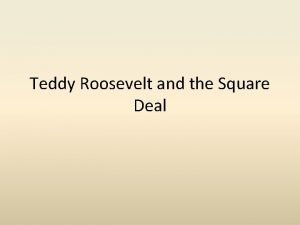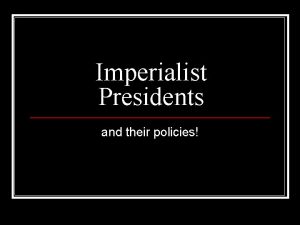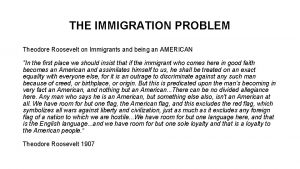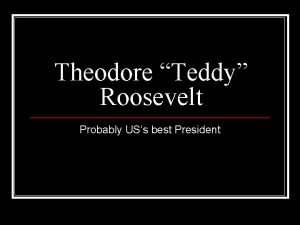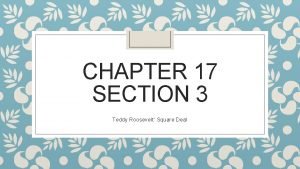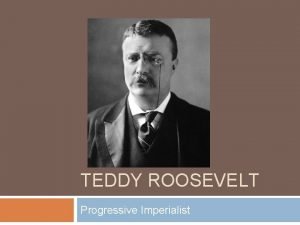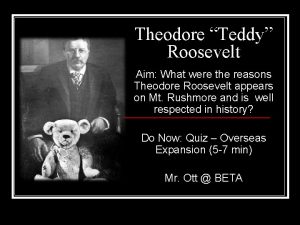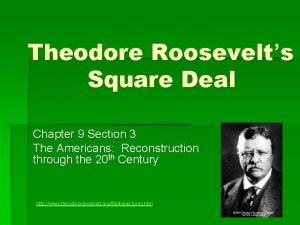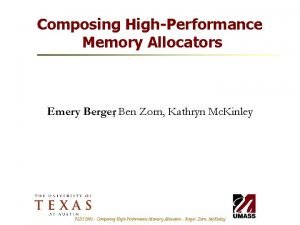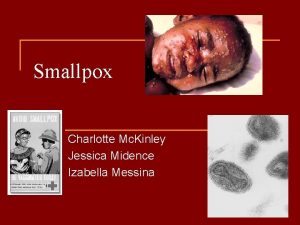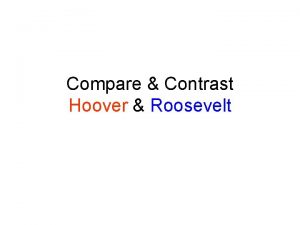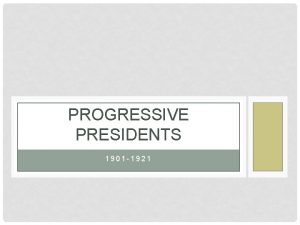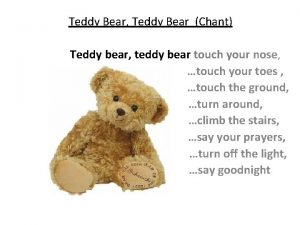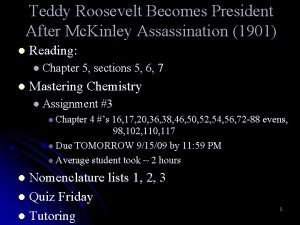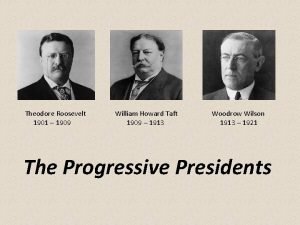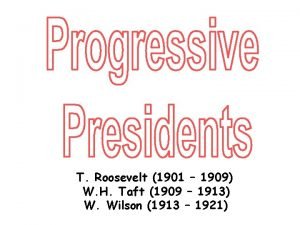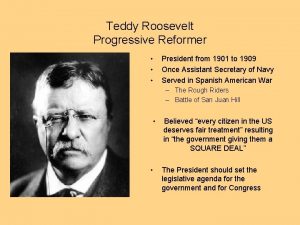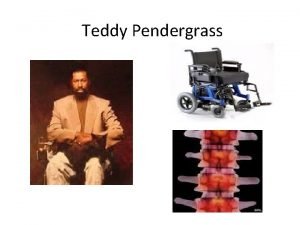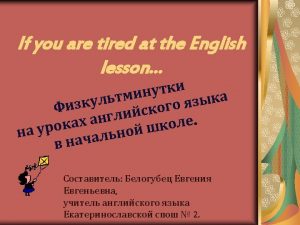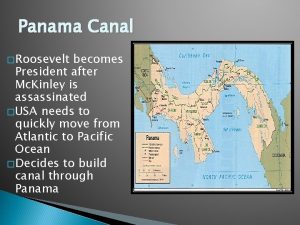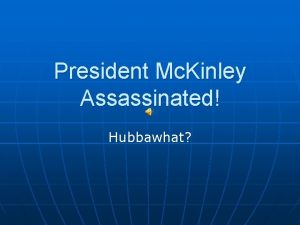Teddy Roosevelt President 1901 1909 After Mc Kinley













- Slides: 13


Teddy Roosevelt • President 1901 – 1909 – After Mc. Kinley was assassinated • Left office in 1908—thought that W. H. Taft would continue policies in place – Ended up splitting the Republican party into 2 • Angered Progressives created a new political party • Tariffs, monopolies and conservationism • 1912 –Roosevelt reenters politics – Runs as Progressive candidate against Taft and (D) Woodrow Wilson (Republicans split) • Wilson wins

Teddy Roosevelt • Dramatically changed the way the Federal Government interacted with the economy and society • Increased Government role – Dept. of Labor (working conditions, pay, hours, etc. ), Forest Service (conservation of natural resources), Federal Trade Commission, (monitor business practices) etc. – Graduated taxes • Give $$ to Government to help pay for all of this

Teddy Roosevelt • Interesting Facts – 1 st to leave the country (Panama) – 1 st American to win Nobel Peace Prize – Blind in left eye from boxing injury (while President) – Skinny dipped in Potomac during winter months – 1 st President to fly (1910) – Youngest President (42)

Teddy Bears • Teddy Bear named after him • Hunting trip 1903 • Tied bear to a tree • Didn’t want to hunt this way • Political Cartoon made

Teddy Roosevelt • On October 14, 1912, Roosevelt was campaigning in Milwaukee, Wisconsin when a local saloon-keeper shot him. The bullet lodged in his chest after passing through a jacket pocket containing his steel eyeglass case and a copy of his 50 page speech which had been folded in half. Roosevelt concluded that since he wasn’t coughing blood the bullet had not penetrated the chest wall into his lung. He declined immediate treatment and gave his 90 minute speech with blood seeping from the wound into his shirt. “Ladies and gentlemen, I don’t know whether you fully understand that I have just been shot, ” Roosevelt said, “but it takes more than that to kill a Bull Moose. ”

Intro to WWI Guided Notes Read pages 336 - 350 and take notes – answer these questions in your notes • • • What is imperialism? Why did the U. S. feel the need to become a world power? How did the U. S. gain control of Hawaii? What is Yellow Journalism? List the events that led to the explosion of the Maine. How did the explosion impact the war? What is jingoism? How did this concept impact U. S. expansion? Who were the Rough Riders? How did they impact the Spanish American war? Explain the Platt Amendment. How did the U. S. acquire the Philippines? Why did Roosevelt want to build the Panama Canal? Explain how his theory of “Speaking softly, but carrying a big stick” impacted U. S. foreign policy. How did Taft and Roosevelt differ in foreign diplomacy?

Intro to WWI • What is imperialism? – Economic and Political domination of a nation over a smaller, weaker one. • • British imperial rule over India Africa being split up by European nations Desire for raw materials and more territory Acquire military bases all over the world • Why did the U. S. feel the need to become a world power? – Wanted to complete on a global stage. – Feeling of superiority – Manifest destiny • It was the U. S. ’s destiny to expand overseas

Intro to WWI • How did the U. S. gain control of Hawaii? – – Trade with Asia grew, wanted a port Ended tariffs on sugarcane to help Hawaiians Planters wanted to become part of the U. S. Overthrew the monarchy • What is Yellow Journalism? – Sensationalized reporting to help sway readers in a certain way • Falsified atrocities sway people to support Cuban rebels – This style of journalism still around today, works on the uninformed

Intro to WWI • List the events that led to the explosion of the Maine. How did the explosion impact the war? – Cuba was a Spanish colony, Cuban rebelled against Spain, declared independence. US stayed Neutral, but yellow journalism helped sway public appeal. The Spanish sent 200, 000 troops to put down rebellion. Cubans refused to negotiate, rioted in Havana. US sent the USS Maine to protect US citizens in Cuba. On February 15, 1898, the Maine exploded. This put pressure on Mc. Kinley to declare war against Spain and to demand the freedom of Cuba. On April 24 th, Spain declared war on US.

Intro to WWI • What is jingoism? How did this concept impact U. S. expansion? – Jingoism in nationalism backed by aggressive foreign policy – Helped pressure war against Spain, annexation of Guam, Puerto Rico, Philippines—made US an imperial power • Who were the Rough Riders? How did they impact the Spanish American war? – During Spanish American war, it was a volunteer cavalry unit led by Roosevelt. They helped secure Santiago Harbor by capturing the land based guns that kept the Navy at bay.

Intro to WWI • Explain the Platt Amendment. – Made Cuba and American protectorate (technically Independent, but under control of US). Also allowed for US to have a military base there (Guantanamo Bay) • How did the U. S. acquire the Philippines? – After U. S/ defeated Spain (1898), it was annexed by US for $20 million. Philippines became independent in 1946.

Intro to WWI • Why did Roosevelt want to build the Panama Canal? Explain how his theory of “Speaking softly, but carrying a big stick” impacted U. S. foreign policy. – Believed that displaying power would deter nations from fighting the U. S. A proverb advising the use of caution and nonaggression, but the ability and power to use force if necessary. • How did Taft and Roosevelt differ in foreign diplomacy? – Taft placed less emphasis on military force and the image of power in the world, and more on economic development, especially in Latin America. Called “Dollar Diplomacy”
 Cinderella dressed in yellow went upstairs to kiss a fella
Cinderella dressed in yellow went upstairs to kiss a fella Teddy roosevelt and the square deal
Teddy roosevelt and the square deal Teddy roosevelt imperialist
Teddy roosevelt imperialist Teddy roosevelt's square deal worksheet
Teddy roosevelt's square deal worksheet Duke ellington teddy roosevelt
Duke ellington teddy roosevelt Teddy roosevelt on immigration
Teddy roosevelt on immigration Teddy roosevelt death
Teddy roosevelt death Chapter 17 section 3 teddy roosevelt's square deal
Chapter 17 section 3 teddy roosevelt's square deal Teddy roosevelt imperialist
Teddy roosevelt imperialist Teddy roosevelt death
Teddy roosevelt death Chapter 9 section 3 teddy roosevelts square deal
Chapter 9 section 3 teddy roosevelts square deal Ben zorn
Ben zorn El vial de kinley
El vial de kinley Compare and contrast hoover and roosevelt great depression
Compare and contrast hoover and roosevelt great depression

